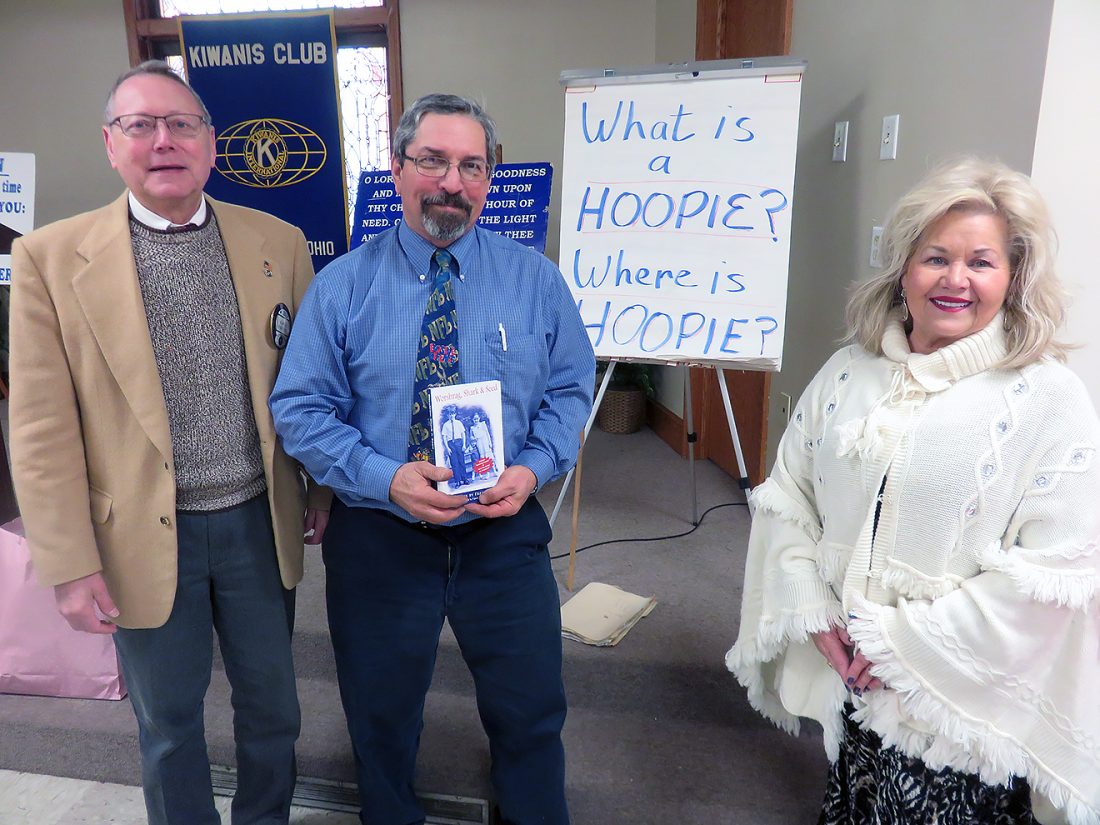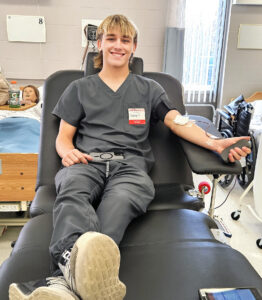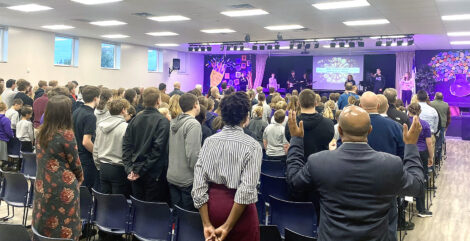A lesson on Hoopie for Kiwanis

GUEST SPEAKER — The January meeting of the Steubenville Kiwanis Club featured Fred Miller, top center, as the guest speaker, shown with Larry Coleman, January program chair, and Phyllis Riccadonna, who led the meeting. Miller is the author of “Worshrag, Shark & Seed,” a compilation of some of his weekly columns written when he worked for the East Liverpool Review. One included “Rules for Speaking Better Hoopie,” which he shared with the Kiwanians. -- Janice Kiaski
STEUBENVILLE — A lesson on what is a Hoopie and how to speak it was cause for chuckles and insight when the Steubenville Kiwanis Club members welcomed retired newspaperman and author Fred Miller into their midst.
As speaker at a recent January luncheon meeting held at the YWCA of Steubenville, Miller was introduced by Larry Coleman, January program chair.
Miller worked for more than four decades in journalism, including serving as a beat reporter, photographer and columnist at the East Liverpool Review, where he started in 1980. He retired in 2016 from Lincoln Learning Solutions in Beaver, Pa., and has since written a book titled “Worshrag, Shark & Seed.” It’s a compilation of 50 of the more than 700 weekly columns he wrote with the book title constituting the pseudonyms he used for his three children.
The book is available for $10 online at www.fredmilleratlarge.com and at various Columbiana County locations. Locally it’s at Historic Fort Steuben’s gift shop.
Miller presented doorknobs made in East Liverpool for those correctly answering a few of his questions, including what is a Hoopie, the subject of one of the columns in his book.
Ceramic doorknob production at East Liverpool potteries began in 1849, and, at one time, millions of the imperfect ones were dumped along the Ohio River banks.
“I probably dug up 10,000,” he said, estimating his collection still numbers close to 5,000.
A descendant of Hoopies himself, Miller said Hoopies were “poor people from down river.”
In the heyday of East Liverpool potteries, he explained that the ware was packed in straw in large wooden casks and shipped down river by river packet boat. Hoops made by splitting slender tree saplings held the casks together. They were soaked in brine vats to make them more limber, then bent around the barrels and nailed in place. The poor people down river (from Marietta, Meigs County, Parkersburg, Pomeroy and the vicinity) cut the poles, selling them to the packets when they passed back up river.
When they came up river, looking for jobs in the potteries, “they called them poor dumb hoop-polers,” which was shortened to Hoopies.
“When Hoopies came up looking for work, a lot of them went to work in rubber plants up in Akron,” said Miller, who noted he worked the Review, he’d heard the term Hoopie but didn’t know its origin or history. He wrote a column requesting information and got a number of letters in response.
His book identifies a Hoopie as “an Ohioan or West Virginian who lives downriver or came upriver to find a better life.”
In the vein of you might be a redneck if…., Miller said you might be a hoopie if you hang your coat in a clothes press and refer to cardboard as pasteboard and rubber band as gum bands; if you ever used Giant Eagle bags as luggage; if attending a family reunion involved crossing a swinging bridge; if you ever had ramp breath; if you’d eaten persimmons and pawpaws you picked yourself; if the day your mother’s family got indoor plumbing was recorded in the family bible; and if you ever used a shotgun to trim an out-of-reach tree branch.
“When I talk about speaking hoopie it’s the dialect we speak here,” he explained. “We think we sound like Dan Rather an Lester Holt, but we don’t,” he said. “We have a way of speaking, a vernacular where we pronounce words a little differently, and it is a very recognizable dialect.”
Miller’s talk included instructional time to learn to talk Hoopie, making short vowels long (“feesh” is carp); making long vowels short (a “filled” is what the cows are out in); changing one vowel sound to a different one (“keller” is color); adding sounds to words (“bresh” is small branches); adding sounds to words (“affaghan” is the blanket on the back of the couch); and words nobody else uses (“worsh” is wash.)
The Jan. 21 meeting also included club member Phyllis Riccadonna, reading a letter from the Kiwanis Children’s Fund in acknowledgment and appreciation of a recent donation made by club member Wendell Barner, who was presented a pin.


